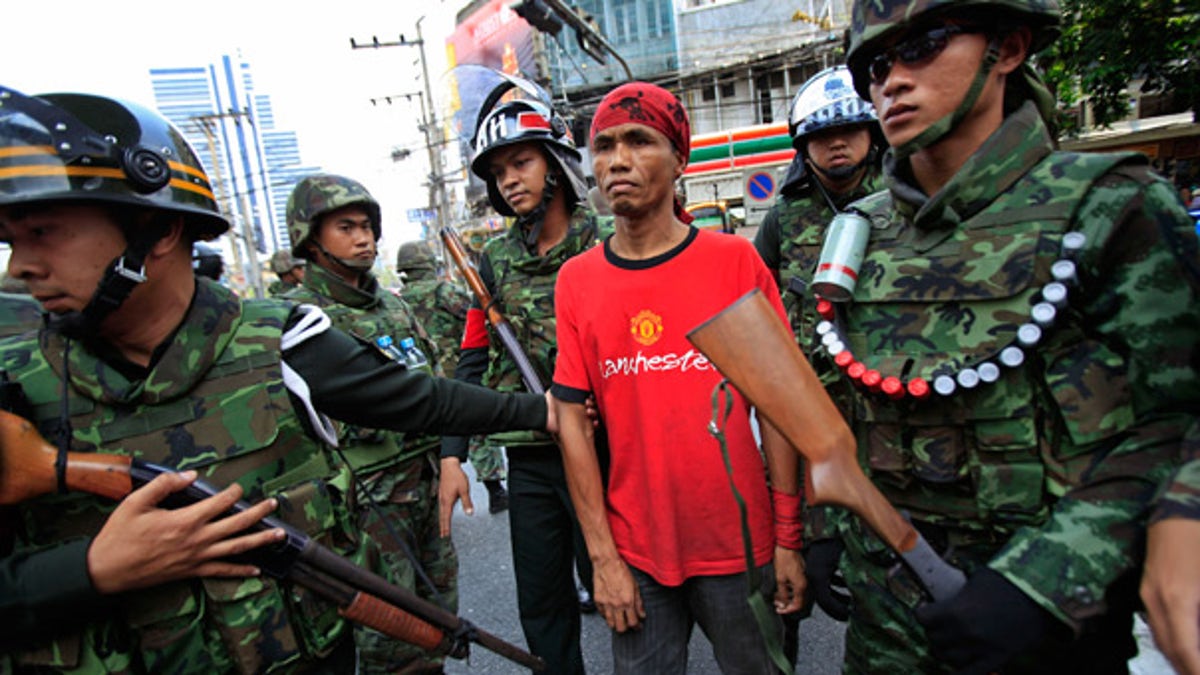
April 25: A "red shirt" anti-government protester is detained by Thai soldiers near the residence of Thailand's prime minister in Bangkok. (AP)
BANGKOK – BANGKOK (AP) — Thai protesters occupying parts of Bangkok to press their demands for new elections vowed Sunday to fight on following a breakdown of negotiations and a televised appearance by the prime minister that offered no solution to the protracted, sometimes bloody crisis.
The so-called Red Shirts urged their supporters in provincial areas to confront the security forces, and many of them began setting up roadblocks outside Bangkok to prevent police reinforcements from entering the city.
Prime Minister Abhisit Vejjajiva spoke in a nationally televised interview alongside the army chief Sunday, in an apparent effort to dispel persistent rumors that there is a rift between him and the military.
The broadcast came a day after Abhisit rejected a compromise offer by the Red Shirts — who say the current government is illegitimate — dashing hopes for a peaceful end to the standoff.
"We won't go home until we win," a protest leader, Khwanchai Praipana, told supporters following Abhisit's appearance.
He said many police and soldiers in the provinces sided with the protesters, and had even asked them to prevent fresh security forces from reaching Bangkok.
"Most police based in the provinces don't want to come deal with the Red Shirts in Bangkok," he said.
More than 1,000 protesters set up a roadblock overnight along a major highway, deflating the tires of 13 police vans and preventing police reinforcements from reaching Bangkok from the northeast province of Udon Thani, the government said.
Another 300 protesters set up roadblocks on the outskirts of the capital Sunday afternoon to stop hundreds of other police from entering the city, police officials said.
Protesters in the Nong Kai province also tried to block police from heading to Bangkok, but the security forces changed their route, the government said.
Clashes in Bangkok have killed at least 26 people and wounded nearly 1,000 since the Red Shirts began occupying Bangkok's commercial center more than a month ago, closing down five-star hotels and shopping malls, paralyzing daily life in the city and costing merchants millions of dollars a day.
The conflict has been characterized by some as class warfare, pitting protesters from the country's vast rural poor against an elite that has traditionally held power.
"The solution process is ongoing but may not please everyone. The government, and not only the military, is preparing to be ready for what would lead to the next level," Abhisit said in a short statement to the interviewer.
He did not specify whether the "next level" meant security forces would move to clear the Red Shirt enclave, but government and military leaders have said that the protesters cannot remain in the heart of Bangkok indefinitely.
The program went off the air briefly, with the prime minister later blaming the disruption on "ill-intentioned people." Thailand's police force, army and other agencies are believed to be infiltrated by Red Shirt supporters, but it was unclear whether the opposition somehow disrupted the television signal.
Thai army chief Gen. Anupong Paochinda, who sat beside Abhisit, said the crisis must be solved by legal means and denied there were any significant divisions within military ranks.
"Being a huge organization, it's possible but the number isn't significant enough to say that the military is divided. More importantly, everyone strictly follows orders," he said.
"We won't use violence but as I've said earlier, the situation has escalated toward violence so the military will have to adjust its measures," the army chief said.
While stopping short of accusing the Red Shirts, Abhisit said that rocket-propelled grenades fired in Thursday's violence in the heart of the city's financial district were launched from a protest stronghold by "terrorists." At least one person was killed Thursday, and 25 others died April 10 during clashes as soldiers unsuccessfully tried to clear the protesters from one of their camps.
Abhisit said he initially underestimated the protest movement. "I admit, I didn't expect to see such a force ready to go this far," he said.
The protesters had previously demanded Parliament be dissolved immediately, while the government said it would disband parliament in six months.
The Red Shirts softened their stance Friday, offering a compromise of 30 days to disband the legislature in a move they said was aimed at preventing further bloodshed. Abhisit rejected that offer.
Meanwhile, six Red Shirts who had been camped at the protesters' increasingly disheveled stronghold in the streets of Bangkok tested positive for the swine flu, BMA General Hospital officials said Sunday.
The Red Shirts consist mainly of rural supporters of former Prime Minister Thaksin Shinawatra and pro-democracy activists who opposed the military coup that ousted him in 2006. They believe Abhisit's government is illegitimate because it came to power under military pressure through a parliamentary vote after disputed court rulings ousted two elected pro-Thaksin governments.
